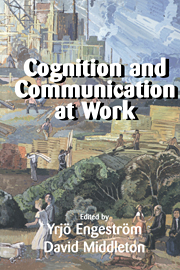Book contents
- Frontmatter
- Contents
- Contributors
- Acknowledgments
- 1 Introduction: Studying work as mindful practice
- 2 Distributed cognition in an airline cockpit
- 3 Constituting shared workspaces
- 4 Seeing as situated activity: Formulating planes
- 5 Convergent activities: Line control and passenger information on the London Underground
- 6 Users and designers in mutual activity: An analysis of cooperative activities in systems design
- 7 System disturbances as springboard for development of operators' expertise
- 8 Expert and novice differences in cognition and activity: A practical work activity
- 9 The tensions of judging: Handling cases of driving under the influence of alcohol in Finland and California
- 10 Talking work: Argument, common knowledge, and improvisation in teamwork
- 11 The collective construction of scientific genius
- 12 Experience and the collective nature of skill
- 13 Working together: Symbolic interactionism, activity theory, and information systems
- 14 On the ethnography of cooperative work
- Index
3 - Constituting shared workspaces
Published online by Cambridge University Press: 05 June 2012
- Frontmatter
- Contents
- Contributors
- Acknowledgments
- 1 Introduction: Studying work as mindful practice
- 2 Distributed cognition in an airline cockpit
- 3 Constituting shared workspaces
- 4 Seeing as situated activity: Formulating planes
- 5 Convergent activities: Line control and passenger information on the London Underground
- 6 Users and designers in mutual activity: An analysis of cooperative activities in systems design
- 7 System disturbances as springboard for development of operators' expertise
- 8 Expert and novice differences in cognition and activity: A practical work activity
- 9 The tensions of judging: Handling cases of driving under the influence of alcohol in Finland and California
- 10 Talking work: Argument, common knowledge, and improvisation in teamwork
- 11 The collective construction of scientific genius
- 12 Experience and the collective nature of skill
- 13 Working together: Symbolic interactionism, activity theory, and information systems
- 14 On the ethnography of cooperative work
- Index
Summary
This chapter takes up the problem of relations between lived work practices and the material environments they inhabit, animate, provide for the significance of, and rely upon (see also Goodwin & Goodwin, this volume). More particularly, the goal is to come to terms with a single case of the moment-to-moment, interactionally achieved production of shared workspaces in the service of joint work. The starting premise is that work activities and workspaces are mutually constituted, in ways that are structured and available for detailed understanding. At the same time, there is an ordering between the two, in that parties engaged in work are not concerned equally with the constitution of the place of their work and with its objects and outcomes. Rather, when all goes well, the former is taken by participants to be a previously given, largely transparent background for the work at hand. To gain insight into the material basis of the structuring of work practices and the practical bases for the structuring of work materials, therefore, requires a closer look.
Lynch has argued (1991) that the physical place of a worksite comprises a complex of equipment and action, of spatial orders produced in and informed by the knowledgeable practices of setting members. Taking up from Shapin the question of the “siting of knowledge production,” he urges an inquiry into the scientific laboratory as “an ecology of local spaces integrated within disciplinary practices” (ibid., p. 74).
Information
- Type
- Chapter
- Information
- Cognition and Communication at Work , pp. 35 - 60Publisher: Cambridge University PressPrint publication year: 1996
Accessibility standard: Unknown
Why this information is here
This section outlines the accessibility features of this content - including support for screen readers, full keyboard navigation and high-contrast display options. This may not be relevant for you.Accessibility Information
- 107
- Cited by
